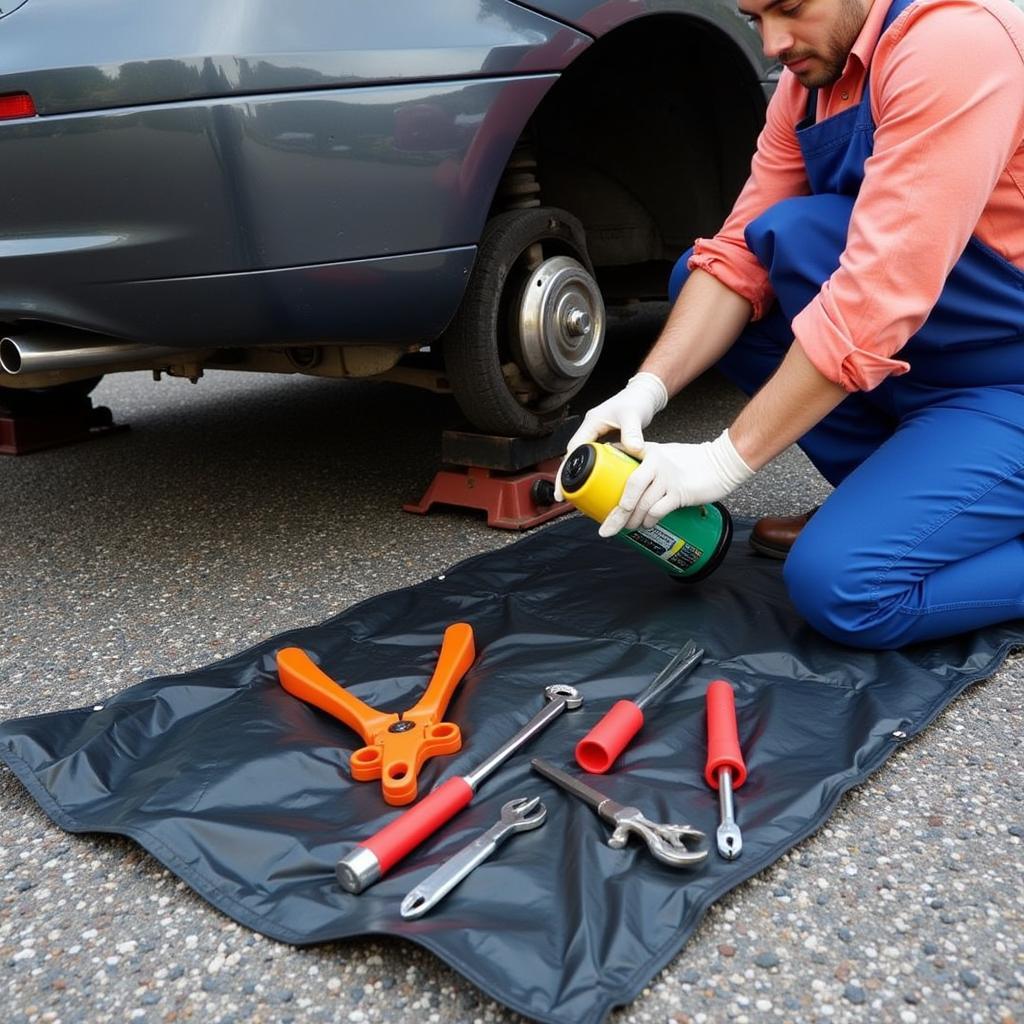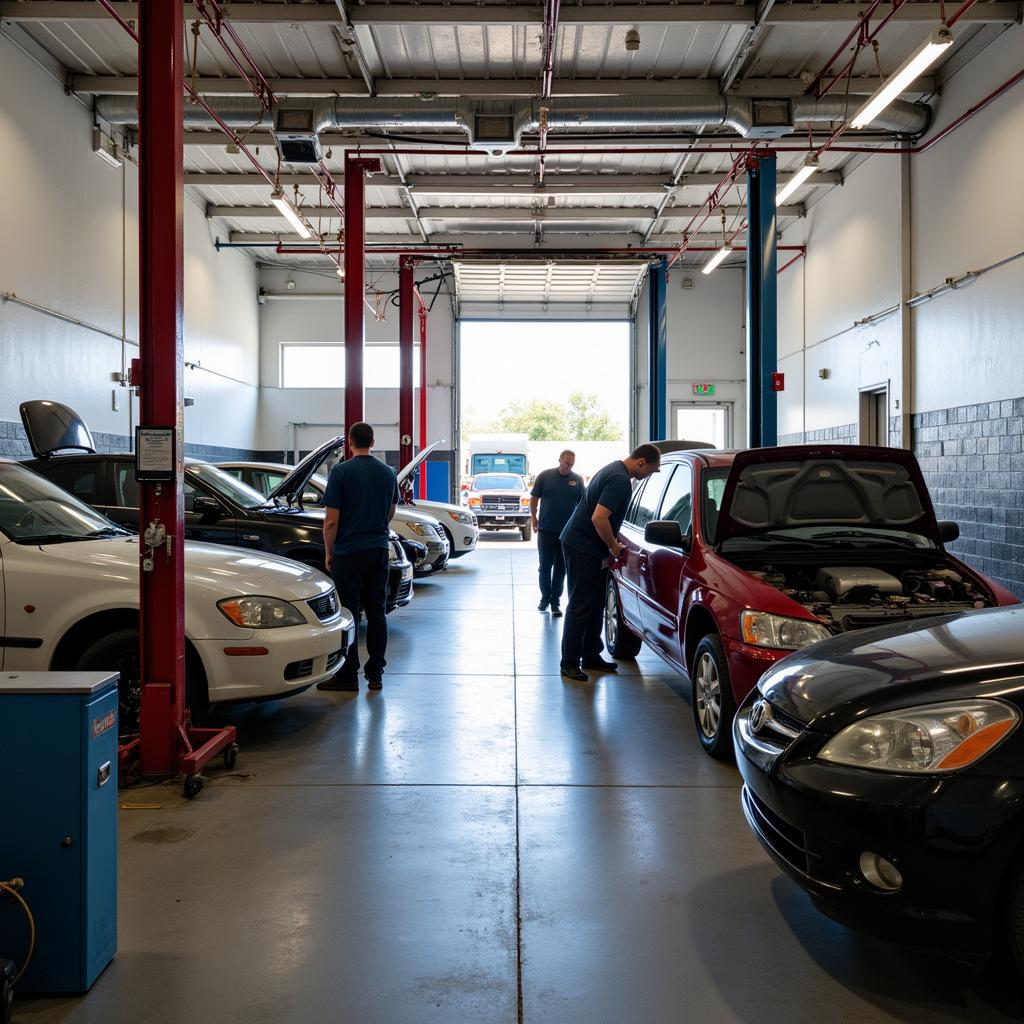Can I Do the Car Service Myself?
Maintaining your car is essential for its longevity and performance. Many drivers wonder, “Can I Do The Car Service Myself?” The answer, like many things related to car maintenance, isn’t a simple yes or no. It depends on your skills, the complexity of the service, and the tools you have available. This guide will explore the possibilities and potential pitfalls of DIY car servicing.
Understanding Car Service Intervals and Types
Before diving into the DIY aspect, let’s clarify what “car service” encompasses. Services range from simple checks to complex repairs. A basic service might involve an oil change, filter replacements (oil, air, cabin), and fluid top-ups. More comprehensive services include spark plug replacements, brake pad changes, and transmission fluid flushes. Each service has its own recommended interval, detailed in your car’s owner’s manual.
 DIY Oil Change
DIY Oil Change
Basic Car Maintenance You Can Do Yourself
Several routine maintenance tasks are easily manageable for the average car owner. Checking and topping up fluids like coolant, windshield washer fluid, and power steering fluid are simple procedures. Replacing wiper blades and air filters are also relatively straightforward tasks that can save you money on labor costs.
Checking and Topping Up Fluids
This is a great starting point for any DIY car maintainer. Locate the respective reservoirs under the hood, consult your owner’s manual for the correct fluid type, and top them up as needed. Remember, never mix different types of fluids.
Replacing Wiper Blades and Air Filters
These components are designed for easy replacement. Most auto parts stores carry a wide selection of wiper blades and air filters, and many offer online tutorials for installation. Ensuring clear visibility and clean air intake are crucial for safe driving.
When to Leave it to the Professionals
While some tasks are DIY-friendly, others require specialized knowledge and tools. Tasks like brake repairs, suspension work, and anything involving the electrical system are best left to qualified mechanics. These systems are critical for safety, and improper repairs can have serious consequences. Additionally, modern cars are increasingly complex, relying on sophisticated computer systems for diagnostics and repairs.
Diagnosing Complex Issues with Diagnostic Tools
Modern vehicles often require specialized diagnostic tools to pinpoint problems accurately. While some code readers are available for consumer use, professional-grade equipment provides much more detailed information. This allows mechanics to identify the root cause of issues quickly and efficiently. Think of it like this: you can treat a symptom, or you can address the underlying cause. A professional mechanic can do the latter.
car air conditiong recharge and service
Is it Worth Doing Car Service Myself?
The decision of whether to DIY or hire a professional depends on several factors. Consider your skill level, the complexity of the task, the cost of tools, and the value of your time. Sometimes, the potential savings might not outweigh the risk of making a mistake and causing further damage.
Evaluating the Cost-Benefit of DIY Car Service
While DIY can save money on labor, factor in the cost of tools and the time investment. If you enjoy working on your car and have the necessary skills, then DIY can be a rewarding experience. However, if you’re unsure or uncomfortable with a particular task, it’s always best to consult a qualified mechanic.
car air conditioning regas recharge service
Conclusion
So, can you do the car service yourself? For certain tasks, absolutely! However, for more complex repairs, seeking professional help is highly recommended. Understanding your limitations and prioritizing safety are key to making the right decision for you and your car. By striking the right balance between DIY and professional service, you can keep your vehicle running smoothly and safely for years to come.
FAQ
- How often should I change my oil? (Refer to your owner’s manual for specific intervals.)
- What are the signs of worn brake pads? (Squealing or grinding noises, reduced braking performance.)
- Can I use any type of coolant in my car? (No, consult your owner’s manual for the correct type.)
- How do I check my tire pressure? (Use a tire pressure gauge and refer to the sticker on your driver’s side doorjamb for the recommended pressure.)
- When should I replace my air filter? (Typically every 12,000 to 15,000 miles, but check your owner’s manual.)
- What are the signs of a failing battery? (Slow engine cranking, dim headlights, clicking sounds when turning the key.)
- How can I tell if my spark plugs need replacing? (Rough idling, reduced fuel efficiency, difficulty starting.)
Need further assistance with your car? Contact us via WhatsApp: +1(641)206-8880, Email: [email protected] or visit us at 456 Oak Avenue, Miami, FL 33101, USA. Our customer service team is available 24/7.

